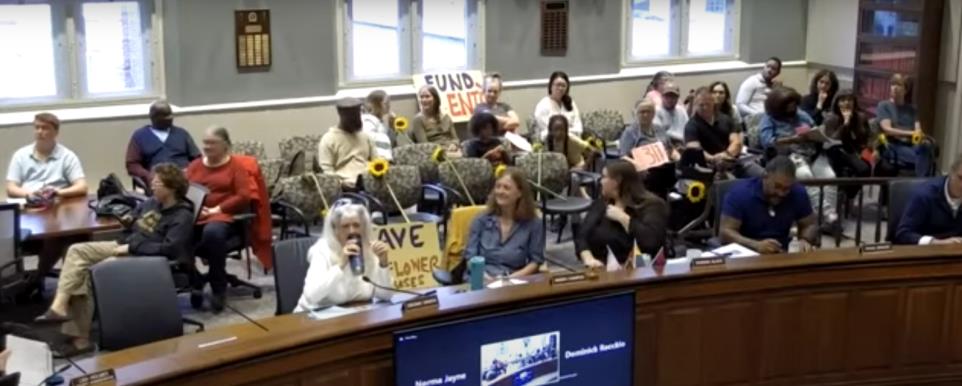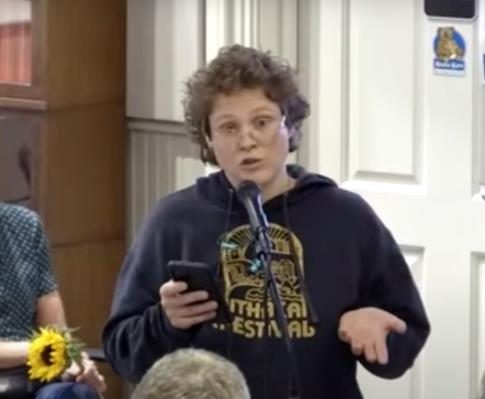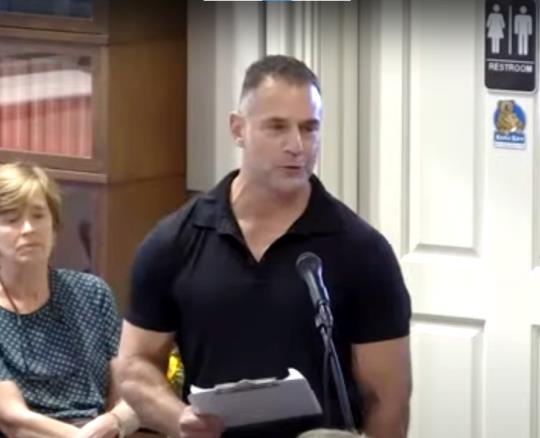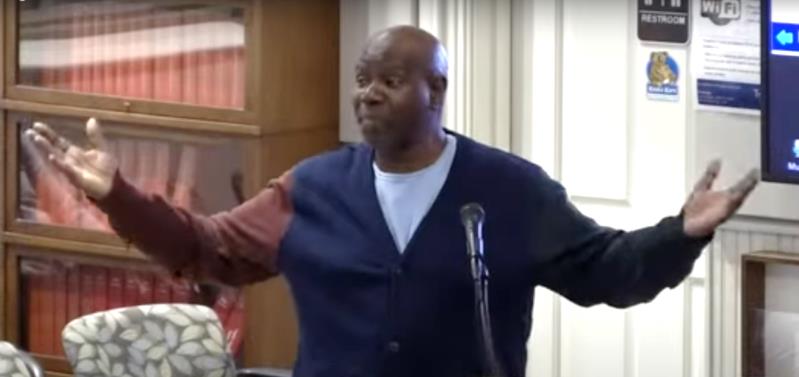
by Robert Lynch; October 3, 2024
Young people handed out cut sunflowers; corny, colorful props, perhaps, yet still symbols of a human service agency that bore the flower’s name. And those sunflower activists weren’t alone. Monday was the people’s night in Tompkins County Legislative Chambers. The 2025 County Budget was up for an informal dissection. And for the most part, those who filled seats in the legislative gallery wanted to make sure that their chosen cause got its sufficient slice.
“Foster a budget that puts people first,” Sasha Raffloer, a worker at the Tompkins County Library, said in support of retaining five or more library positions poised to be cut in the face of austerity.
This was the Tompkins County Budget Forum; an annual, less-than-formal ritual that legislators aren’t required to hold, but do so anyway. The budget’s official Public Hearing comes later. Hardly anyone attends the Public Hearing. Most of the budget slicing has already occurred by then. Agency advocacy after-the-fact serves little useful purpose.
But the Budget Forum is different. The County Budget right now remains very much a live ball. A persuasive pitch by the right person can win an agency a supplemental appropriation—an “Over-Target Request (OTR)” in budget-speak. In the least, it can keep an existing OTR from being stripped away.

Such was the meeting’s context. And 2025 will be a tight budget year. Last April, the Legislature told County Administrator Lisa Holmes to contain her next year’s tax levy increase to two percent. She didn’t. She blew past the directive big-time. She recommended to the Legislature in early-September a more than quarter-Billion spending plan that would hike the tax levy 4.34 per cent.
So far, nobody’s much complained that the Legislature’s April directive was largely ignored. Budget Committee Chair Mike Lane has made it clear that his starting point is Holmes’ “recommended” budget, not that leaner alternative that she dutifully prepared to comply with her order, but now conveniently sets to the side. The alternative “Two Percent Budget” would have required many departments to cut their spending by five per cent. Some department heads balked.
Yet if tradition holds, the recommended budget will grow even fatter by the time it’s adopted. And that’s where Monday’s advocates stepped in.
Twenty-one people spoke to the Legislature Monday night; some in chambers, some on Zoom. Legislators, themselves, sat in silence. Only the Budget Committee Chair, Mike Lane, spoke as moderator.
Administrator Holmes began the forum with an abbreviated summary of the 2025 budget she’s recommended. Holmes largely repeated the message she’d first given to the Legislature September third. No add-ins; no turn-arounds; no surprises.
Of those who addressed the budget, only former Ithaca Mayoral candidate Zach Winn urged that spending be cut. Winn would prefer the legislature adhere to its earlier-proposed—though now largely-tossed aside—directive to keep the tax levy increase at just two per cent. “The current fiscal mess of the County is unsustainable,” Winn said on Zoom.
But Republican Winn was the outlier. A score of others who joined him in chambers or online carried a different message: reach out to us with a more generous helping hand.
Remember those sunflowers? Sunflower House, a transitional living program for the previously-incarcerated, drew the most frequent and passionate support. Dave Sanders, Executive Director of the former Offender Aid and Restoration (now bearing the more PC, yet painfully nondescript and contrived name, “Opportunities, Alternatives and Resources” or “OAR”) spoke in its behalf.
Sanders protested a prospective $40,000 (five per cent) cut in in the OAR budget. Together with reduced Sunflower House assistance, it would cut 16 per cent of his total budget, Sanders said. That’s despite the fact that demand for OAR’s services has risen by 68 per cent in the past 20 months.

“I would like the county administration to think about funding Sunflower House,” Sanders pleaded. “I hope the Legislature will look beyond costs and recognize the humanity of the most vulnerable people in our community.”
As far as cutting costs, the Executive Director would have Tompkins County look inward on itself. He claimed Administration Department expenses have risen 213 per cent since 2017.
Michael Rhymes spoke. Rhymes said he’d spent 39 years in prison, purportedly for a crime he didn’t commit. He spoke to Sunflower House funding.
“I know you’re talking about money and you’re talking about budget, but what’s the cost of a human life?” Rhymes asked.
“People in prison: when they get out, so much pressure. And if they’re not cared for or treated humanely, they tend to revert back to what they did,” Rhymes, the ex-inmate, continued. “Believe me, I’m an expert on prisons. I’ve been around every kind of person you can think of. And the majority of them want to come home, they want to do right, but who’s supporting ‘em?”
Speakers spoke in support of the police-monitoring Community Justice Center, the “Unbroken Promise” minority advocacy agency, the County Library, and Tompkins Learning Partners. Most talked not of dollars, but of programmatic passion. One woman urged funding for a program to teach constitutional rights literacy.
And on the flip side, the money-draining Ithaca Tompkins Airport took a hit.
Former Enfield Supervisor aspirant Amanda Kirchgessner urged the Legislature to close the airport’s customs facility.
“Cut it out. Get rid of it. Do what you have to do,” Kirchgessner said. “Are you ready to listen to us? Five years ago we said don’t do it. How much have we paid? It’s superfluous and we’re subsidizing the feds.”

Whether they listened to Kirchgessner or not—more likely, they listened to the bean counters—the County Legislature voted Tuesday, one night later, to close the customs facility. It cost Tompkins County $273,000 last year to run it, but returned to the County a mere pittance.
Nonetheless, airport grievances drove deeper. Administrator Holmes’ recommended budget would shovel $642,000 into airport accounts to shore-up its flight-starved operations and pay its debt. To several at the Budget Forum, airport money is money ill-spent.
“The airport has been failing for several years to meet its operational costs,” Bethany Ojalehto Mays told lawmakers. “It is economically unviable,” she insisted. Moreover, “Flying is one of the primary ways that affluent people pollute the world,” she said.
The idea caught on. Amanda Kirchgessner and her mother, Marnie, also a former Enfield political leader, supported airport operational cuts. So did Sophia Finn.
“If we are going to meet our goals as a community, we really need to focus on the human services and the good work of the employees of the County and of the programs to lift up the most vulnerable in our community,” Finn maintained. “You prioritize the people as opposed to the airport or other not-as-crucial capital expenditures.”
That most costly, looming capital expenditure, a $40-60 Million Downtown Center of Government office building, never came up in Monday’s discussions. It’ll be paid for in pieces. According to budget documents, 2025 will be sort of a “bye” year for the building. Architects and engineers must first do what’s needed. Eight-figure spending, nevertheless, could commence in 2026.
****
Yes, legislators sat in silence to hear what the passionate had to say Monday night. This Thursday, October third, they begin that slice-and-dice exercise; voting on what to add, along with what, if anything, to subtract.
Whether any lawmaker truly listened to what was said by the score of speakers at the Budget Forum remains to be judged by later actions. Those sunflowers may stick in a few memories or maybe in many of them as budget meetings move forward. Then, again, they may already have been tossed into the legislative trash can.
###.

